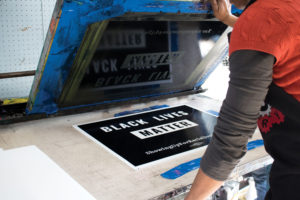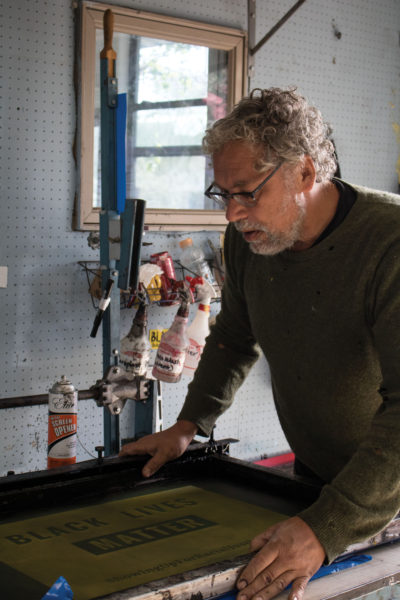By Phoebe Stevens
El Independiente

Dwight Metzger was pretty surprised when his business tripled in size after he relocated it to South Tucson six years ago.
The building he constructed on the once empty property at 238 E. 26th St. now houses two six-color rotating presses, two automatic presses, a vacuum table and several high-volume digital copiers. Using the array of printing machinery, Metzger can screen-print products such as shirts, stickers and signs, and digitally print flyers, posters, booklets, business cards and other paper products.
Supplies line the walls from floor to ceiling. On one shelf, different types of paper, stacked several feet high, rest above one of the large digital printers. On another wall, an alphabetized set of drawers contains pin-back buttons. A mosaic of paper rolls and boxes fill the shelves of a tall, orange industrial shelving unit. Canvases lean against each other near a staircase.
“It surprised me how robust this all has become,” says Metzger. “It’s a challenge to keep up with it, but it’s fun.” Luckily he has many employees to help him out, with a staff that has grown from two people at the beginning of the move to eight full-time and six part-time employees.
The Gloo Factory is a full-service print shop that opened in 2000. Although there are a few cross-country and international clients, the factory primarily provides screen-printing, digital printing, publishing and graphics services for clientele in Southern Arizona.
The print shop supports various progressive causes and offers discounted printing prices to non-profit organizations and activist groups within the community.
It is also part of the Communication Workers of America labor union, which strives to guarantee worker rights and protections, specified pay and employee benefits.
Kevin Barnes has worked at the Gloo Factory for two years. “Folks prefer to come to a union shop because they know that the workers are being treated well,” he says.
Despite his business’ success, Metzger has concerns about his and other businesses’ role in gentrifying South Tucson. The Gloo Factory was forced out of downtown Tucson when the warehouse Metzger was renting was sold for private development. South Tucson appealed to him, as it does to many business owners, because it is affordable and close to downtown. But as affordability brings businesses in, Metzger fears insensitivities could result in a loss of cultural identity in a community he appreciates for its history and tenacity.

“While I recognize that I’m a part of [the gentrification of South Tucson], we try to pay attention to our impacts and to make sure we are working in the community and engaging with the concerns of the neighborhood,” he says.
Community engagement has always been important to Metzger, who began printing to provide affordable services for the activist community. The progressive mission is evident in the various printed signs sitting in the shop. “I ‘Heart’ My Muslim Neighbor” reads one sign, propped up against a worktable. “Black Lives Matter” reads another.
“I really love all the various causes that we support and being part of the community,” says Barnes.
In moving to South Tucson, The Gloo Factory has stayed true to Metzger’s goal to serve the progressive community. Metzger and his union workers print for many non-profit organizations residing within the city, such as the House of Neighborly Service, Casa Maria and Derechos Humanos.
Looking ahead, Metzger would like to open a walk-in, self-service print shop in the garage adjacent to the main Gloo Factory.
“The way that we grow,” Metzger says, “I want to make sure that we’re doing that with a mind to what the people here need.”
Phoebe Stevens is a reporter for El Independiente, a publication from the School of Journalism with the University of Arizona. Contact him at [email protected].

